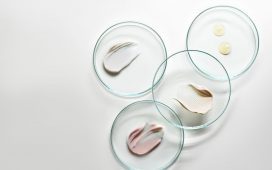Imagine, rather than reaching for your usual antiperspirant after a workout, grabbing a deodorant infused with coconut oil and honeysuckle instead. A growing number of people are doing just that, seeking a more natural way to stay fresh.
While the ingredients in natural deodorants often sound similar to those of a cake recipe – honey, baking soda, arrowroot and beeswax are all common – it hasn’t stopped consumers forking out between £5 and £30 for these products. They work by combatting odour-causing bacteria with essential oils, such as tea-tree, that have antibacterial properties – and they are cropping up everywhere from health stores to the armpits of Justin Bieber and Kourtney Kardashian.
There were 577,190 online searches in the past 12 months for products including “eucalyptus deodorants” and “aluminium-free deodorants”, according to research by the data provider SEMRush, with Weleda, Salt of the Earth, Native, Myro, Malin+Goetz and The Natural Deodorant Company topping the list of the most searched-for brands.

One natural soda-deodorant brand, Ben & Anna, which launched in early 2018, expects its sales to exceed £2m this year, while Lululemon, a Vancouver-based athleticwear company, released Anti-Stink deodorant last month as part of a set of wellness products. It describes using probiotics to limit the growth of odour-causing bacteria and zinc to absorb moisture.
According to Siva Kumar, a skin specialist at the McIndoe Centre in West Sussex: “There has definitely been a rise in preference for natural products in the past few years, due to greater understanding surrounding the effects of harsh chemicals, and increased ethical consumerism.” A rise in concern about some of the ingredients found toiletries, such as parabens, propylene glycol and phthalates, has fuelled the movement. So have suggestions from some scientists that aluminium, an active ingredient in antiperspirants that works by blocking sweat glands, could be linked to an increased risk of breast cancer and Alzheimer’s disease. SEMRush says one in five searches relating to natural deodorant in the past year were for aluminium-free products.
But how much of this fear around our bog-standard deodorants is legitimate? “The positive correlation between underarm products and cancer is inconclusive and requires further investigation,” says Kumar. The US-based Alzheimer’s Association has also attempted to demystify the notion that aluminium-based products contribute to memory loss, given that research exploring the link is similarly inconclusive. As the organisation has noted, early scientific studies involved animals that had a greater susceptibility to aluminium than humans, with the results leading to incorrect assumptions about the metal’s effect on the human body.
“[Brands] have exploited the gap in consumers’ knowledge surrounding cosmetic chemistry, using fear-marketing phrases such as ‘free from’, ‘no nasties’, ‘chemical free’ and ‘clean’,” says Sam Farmer, a cosmetic scientist and a former council member of the Society of Cosmetic Scientists who has created a range of comestics for adolescent hair and skin. Given that he can’t think of an antiperspirant on the market that does contain parabens – “the actives will preserve the product, so parabens wouldn’t be used in formulation anyway” – he is concerned that these marketing claims are just “smoke and mirrors”.
As with any holistic skincare trend, figuring out what works for you will involve trial and error. For example, natural deodorants will neutralise odour, but they won’t stop you from sweating. If you sweat a lot, Kumar advises that you opt for an antiperspirant, to minimise moisture, and a deodorant, to limit odour. As Farmer puts it: “Consumers must choose and use whatever products they want, but these choices should be free to make, not because they’ve been scared into it by duplicitous, manipulative and exploitative marketing claims.” Ultimately, whether you opt to free the pit is up to you.













